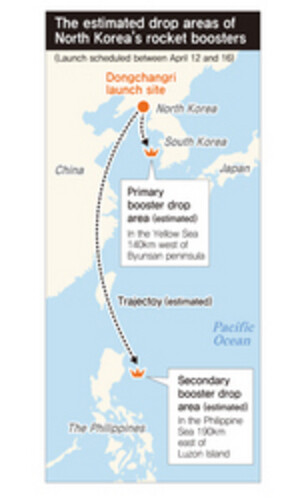hankyoreh
Links to other country sites 다른 나라 사이트 링크
US frustrated with North Korea’s mixed messages

By Kwon Tae-ho, Washington correspondent
The US faces a dilemma regarding recent acts by North Korea. Pyongyang will accept a team of International Atomic Energy Agency (IAEA) monitors as agreed upon with Washington at a Beijing meeting Feb. 29, but also announced plans on March 16 to go ahead with a long-range rocket launch next month.
North Korean vice-foreign minister Ri Yong-ho announced Monday that North Korea had requested the IAEA send a team to monitor the halting of its uranium enrichment program in accordance with the February agreement with the US. The agency confirmed the invitation from North Korea and said it would discuss the specifics with Pyongyang and the other countries involved.
When asked for comment at a regular press briefing Monday, US State Department spokesperson Victoria Nuland said the satellite launch violated both a United Nations Security Council resolution and North Korea’s deal with the US irrespective of the hosting of an IAEA team.
Nuland’s comments indicate that the US is not in line with Pyongyang’s insistence that the rocket launch and its agreement with Washington are separate issues. The Korean Central News Agency issued a piece Tuesday titled “Satellite Launch Does Not Conflict with NK-US Agreement,” claiming that the launching of a satellite is different from the firing of a long-range missile. The US, in contrast, is linking the launch with the agreement, stating that it is unlikely to provide food aid as agreed upon on Feb. 29 if North Korea goes ahead with the rocket launch.
[%%IMAGE2%%]When asked whether the US was not opposed to the IAEA’s sending of a team before the satellite launch, Nuland responded that it “depends on the circumstances of the invitation and what the IAEA is able to see.
"We’re not opposed for opposition’s sake," she added.
Analysts are taking this to mean that Washington does not intend to give up on the IAEA monitoring card.
Observers are now focusing on whether the IAEA monitors will actually be dispatched before the satellite launch. A South Korean government official predicted that the agency would be unlikely to inspect the Yongbyong facilities in accordance with the Feb. 29 agreement simply based on an invitation from North Korea at a time when Washington is denouncing the satellite launch announcement as a violation of that agreement.
The situation is ultimately in Washington’s hands, leaving the Obama government facing deeper and deeper concerns. The US also has yet to get clear responses from China and Russia to North Korea’s rocket launch plans.
Nuland said in the March 19 briefing that "every single one of the Six-Party Talks participants [except North Korea] made clear that they think that this would be an extremely bad idea and a violation of UN Security Council resolutions.“ She also emphasized, "both Russia and China have made clear that North Korea should not violate its international obligations."
However, journalists followed this up with aggressive questioning about whether Russia and China equated the satellite launch with a missile launch.
Please direct questions or comments to [english@hani.co.kr]
Editorial・opinion
![[Guest essay] Amending the Constitution is Yoon’s key to leaving office in public’s good graces [Guest essay] Amending the Constitution is Yoon’s key to leaving office in public’s good graces](https://flexible.img.hani.co.kr/flexible/normal/500/300/imgdb/original/2024/0416/8917132552387962.jpg) [Guest essay] Amending the Constitution is Yoon’s key to leaving office in public’s good graces
[Guest essay] Amending the Constitution is Yoon’s key to leaving office in public’s good graces![[Editorial] 10 years on, lessons of Sewol tragedy must never be forgotten [Editorial] 10 years on, lessons of Sewol tragedy must never be forgotten](https://flexible.img.hani.co.kr/flexible/normal/500/300/imgdb/original/2024/0416/8317132536568958.jpg) [Editorial] 10 years on, lessons of Sewol tragedy must never be forgotten
[Editorial] 10 years on, lessons of Sewol tragedy must never be forgotten- [Column] A death blow to Korea’s prosecutor politics
- [Correspondent’s column] The US and the end of Japanese pacifism
- [Guest essay] How Korea turned its trainee doctors into monsters
- [Guest essay] As someone who helped forge Seoul-Moscow ties, their status today troubles me
- [Editorial] Koreans sent a loud and clear message to Yoon
- [Column] In Korea’s midterm elections, it’s time for accountability
- [Guest essay] At only 26, I’ve seen 4 wars in my home of Gaza
- [Column] Syngman Rhee’s bloody legacy in Jeju
Most viewed articles
- 1[Guest essay] Amending the Constitution is Yoon’s key to leaving office in public’s good graces
- 2[Editorial] 10 years on, lessons of Sewol tragedy must never be forgotten
- 3Faith the power of memory: Why these teens carry yellow ribbons for Sewol
- 4[Guest essay] How Korea turned its trainee doctors into monsters
- 5US grants Samsung up to $6.4B in subsidies for its chip investments there
- 6[News analysis] Watershed augmentation of US-Japan alliance to put Korea’s diplomacy to the test
- 7How Samsung’s promises of cutting-edge tech won US semiconductor grants on par with TSMC
- 8Korea ranks among 10 countries going backward on coal power, report shows
- 9K-pop a major contributor to boom in physical album sales worldwide, says IFPI analyst
- 10An unfinished quest to uncover true story of Sewol sinking, as told by a bereaved parent